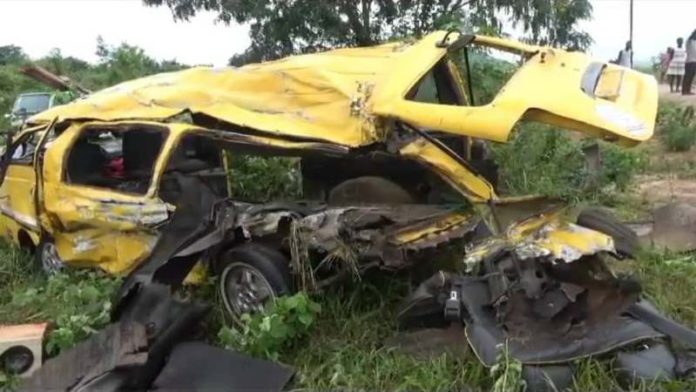Trend analysis indicates that six persons died daily from road crashes, the National Road Safety Authority (NRSA) has stated.
Again, 68.2 per cent of those killed in road crashes were between the active age group of 16 and 55 years.
The Director of Research, Monitoring and Evaluation of NRSA, Daniel Wuaku, who presented the data at a meeting with some heads of churches in Accra, added that 16 per cent of the accidents occurred on Fridays and Sundays, with the Greater Accra, Ashanti and Eastern regions together contributing 70 per cent of the crashes.
The data further shows that an average of 70 per cent of the road crashes occurred on flat and straight roads, with speeding being the major cause, accounting for over 50 per cent of the reported cases.
Road crashes attributed to buses and mini-buses accounted for 28 per cent, while saloon cars and heavy goods vehicles (HGV) accounted for 13 per cent and 14 per cent respectively, the director of research said.
The NRSA’s data also show that over 50,000 people died through road crashes between 2000 and 2022.
The acting Director-General of NRSA, David Adonteng, therefore, called on religious leaders to use their pulpits to educate, inspire positive change and create a culture of safety on roads to help reduce road crashes in the country.
Consequences
He indicated that the country, like many others, had suffered from the devastating consequences of road traffic crashes with lives lost, families shattered and communities left in grief.
The meeting is part of activities by the NRSA to engage all segments of society on road safety.
Dubbed: “Adoption of Road Safety Education”, it formed part of the authority’s “Stop Speeding Stay Alive Campaign” to reduce road crashes which usually increases during festive period.
Mr Adonteng said religious leaders needed to use their influence to preach safety and educate their members on the importance of complying with road safety regulations as Christmas approaches.
“The festive season is characterised by increased volumes of vehicles and people on the road space travelling in different modes for various purposes, including conventions, 31st watch night service, among others,” he stated.
Impact
Mr Adonteng stated that the impact of road traffic crashes could be enormous, affect societies and individuals in different facets, hence expressed the belief that religious leaders could make a significant impact in their advocacy on the well-being of their communities and improve road safety in their daily lives.
The acting Director-General of NRSA entreated the church to protect the lives of their members by engaging them on road safety issues, as they preached love and the birth of Christ.
Mr Adonteng stressed the need for worshippers to stay alive in their daily commute during the Christmas season.
“Your teachings emphasise compassion, empathy and the value of human life. It is commendable that we translate these principles into action by advocating responsible road user behaviour,” he stated.
The Director-General urged the clergy to encourage congregants to adhere to and respect traffic rules and regulations such as speed limits, wearing of seatbelts, and avoiding dangerous manoeuvring.
“Let us not forget the most vulnerable road users in our society—children, the elderly and individuals with disabilities. They are particularly susceptible to the dangers of reckless driving. It is our duty to advocate for their protection and ensure that our roads are safe and accessible for all,” Mr Adonteng stressed.
Appoint
The Director, Regulations, Inspections and Compliance of NRSA, Kwame Atuahene, urged members of the clergy to appoint road safety focal persons to coordinate the safe transportation of congregants.
He said the enforcement of the regulations of the new Legislative Instrument (LI) 2468 would be effective from March 30, next year, for non-governmental organisations (NGOs), transport departments, importers of road safety equipment, tyre technicians and mechanic shops.
Mr Atuahene said the belief was that it would enable the authority to regulate road transport operations in the country and promote sanity and reduce crashes on the roads.
He added that the Electronic Interface (TransportGhana) was about 95 per cent complete and would go live by January 2024 to facilitate online registration and other regulatory services.
Welcome
In an interview the Director of Public Relations of the Methodist Church Ghana, Very Rev. Eric Amihere, commended the NSRA for the initiative.
He stated: “It is a good call the church welcomes and will continue to spread the good message of protecting lives and property on our roads.”
Very Rev. Amihere added that the church had an obligation to protect and preserve the lives of its members by preaching safety on the roads.
He said per the statistics, most of the road crashes were caused by human error, and, therefore, urged Ghanaians to love and tolerate one other while on the road.
Background
A 2021 Accra Road Safety Report ranked the George Walker Bush Highway segment of the National Road One (N1) as the riskiest in Accra.
It also cited the Opeibea, Lapaz, North Dzorwulu, Kawukudi and Hansonic intersections as the top five fatal crash intersections in the capital.
It also named distances between the Apenkwa overhead and Dimples Roundabout, Akweteyman to Lapaz, the Airport Junction to North Dzorwulu intersection, the Abeka Junction to Total Station (J.A. Kufuor Avenue), and the Hansonic to Kaneshie First Light as the top five fatal crash corridors in the city.
Overall, the contribution of speeding to the crashes increased from 50 per cent in 2021 to 51 per cent in 2022, indicating that speeding remains the main risk factor for severe road crashes.
The report was done in collaboration with the National Road Safety Authority, the Ghana Police Service, the Accra Metropolitan Assembly and other local city authorities with support from Bloomberg Philanthropies.
Mahama is the godfather of digitalisation, not Bawumia – Asiedu Nketia
Akufo-Addo recognises over 280 achievers of Head of State Award 2023

